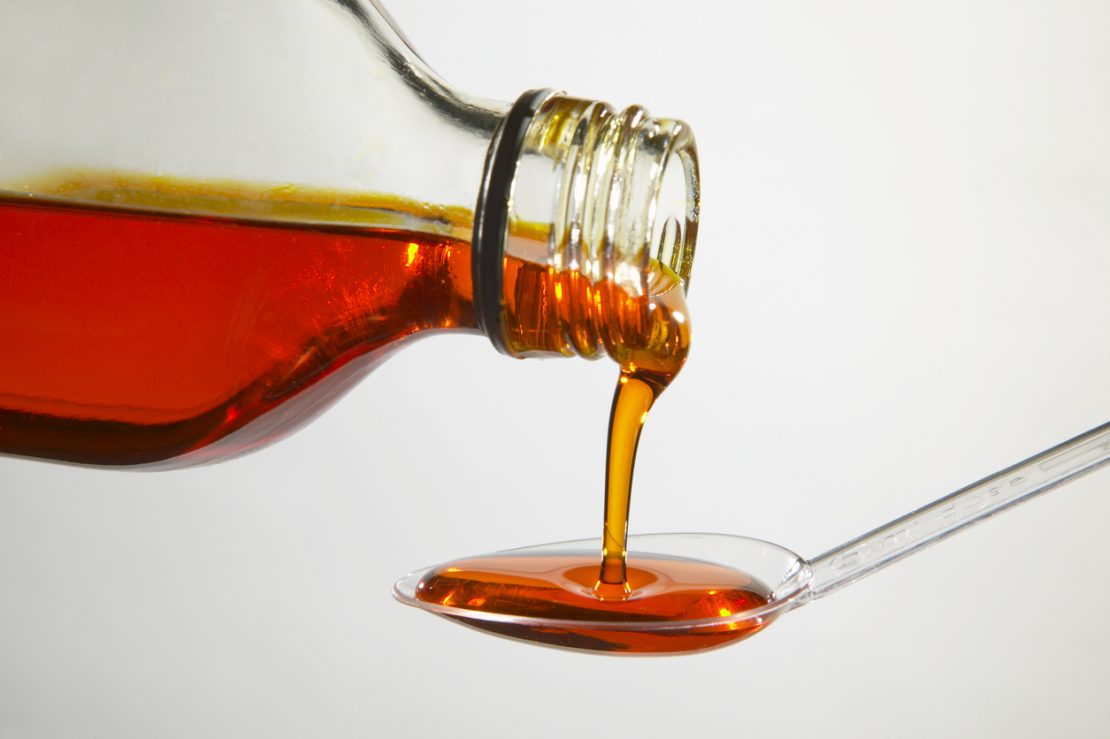We spend hundreds of millions of dollars each year on the stuff. It’s in almost everybody’s medicine cabinet. But it’s a total waste of our hard-earned money.
It doesn’t work…and it’s dangerous.
At least 15 clinical trials have proven that using cough syrup is no better than taking a placebo.[1]
We spend almost $600 million a year on over-the-counter cough syrup, according to Drug Store News magazine.[2]
The American Chemical Society recently reviewed years of studies on the effectiveness of OTC cough medicines. They concluded “there is no good evidence” that OTC medicines have any beneficial effect on a cough.
Dr. Norman Edelman is chief medical officer at the American Lung Association. He says health authorities have known for years that cough syrups don’t work.
“We’ve never had good evidence that cough suppressants and expectorants help with cough,” he says. “But people are desperate to get some relief. They’re so convinced that they should work that they buy them anyway.”[3]
Coughing Isn’t Always a Bad Thing
Coughing serves an important function. It keeps unwanted material like phlegm and germs from entering your lungs. When there are irritants in your nose and mouth, receptors send signals to your brain. In turn, the brain sends a message back to your diaphragm to expel the irritants by coughing.[4]
It’s perfectly normal to have a lingering cough for about two weeks after a cold. It may be distracting, but it does not need medical attention.
However, if a cough lasts longer than three weeks—or is accompanied by coughing up blood, shortness of breath, confusion, or high fever—you should see your doctor. It could be a sign of asthma or heartburn.
The Danger of Cough Syrups
Cough syrups usually contain dextromethorphan. It’s often referred to as DM or DXM. It supposedly blocks the cough reflex. But as we mentioned earlier, there’s no good evidence it works.
DXM comes with all kinds of nasty side effects. They include dizziness, nausea, irregular heartbeat, seizures, confusion, impaired judgement…and in rare cases even brain damage and death. It becomes even more dangerous when mixed with alcohol.[5]
In high doses, DXM causes hallucinations, euphoria, and loss of motor control. This has made it a popular drug of abuse.
Some formulas contain guaifenesin and antihistamines as well. Guaifenesin is an expectorant. It’s supposed to reduce chest congestion. Side effects include dizziness, headache, rash, and nausea.[6]
Antihistamines dry your sinuses. They cause drowsiness and do nothing for your cough.
Many parents can’t bear to hear the sound of their child coughing harshly. But they may be doing more harm than good by dispensing cough syrup. Thousands of children every year are rushed to emergency rooms with accidental cough syrup overdoses.[7]
The FDA was so worried about this problem that it convened a panel to set age guidelines. They concluded that OTC cough and cold medicine should not be given to children under age 6.[8]
Safe and Natural Cough Relievers
What’s the best way to treat a cough?
The National Health Service of England, the British version of our FDA, recommends opting for “a homemade cough remedy containing honey and lemon” instead of wasting money on commercial cough syrups.
Several studies have shown that drinking raw honey and lemon juice mixed with hot tea improves a cough. The honey coats the throat and relieves irritation. The lemon provides vitamin C, which boosts your immune system.
Never give honey to children under a year of age due to the risk of botulism.
Here is another remedy you will love: Eat dark chocolate. It contains the nutrient theobromine.
A British study of 300 cough sufferers found that 60% saw relief by eating dark chocolate. In the study, chocolate worked better than even codeine, an opioid found in strong prescription cough medicines. Theobromine has no side effects.
The darker the chocolate, the better. Unsweetened dark chocolate has 450 mg of theobromine per ounce, compared to only 60 mg in milk chocolate.
One more thing… If you suspect you may coronavirus, don’t take cough syrup with DXM. New research has found it appears to boost replication of the coronavirus in laboratory conditions.
That doesn’t necessarily mean it does the same thing in the human body. But why take the risk?
Editor’s Note: Unlike much of the mainstream media, we don’t accept advertising from Big Pharma. That’s why you can count on us for unbiased medical information. Our only motivation is your good health.
Our monthly journal Independent Healing brings you important, science-based health news you won’t find anywhere else. To subscribe, go HERE.
Related Articles
Honey Is Better Than Antibiotics for Coughs and Colds, Study Finds
Coronavirus: Don’t Use Cough Syrup
Coronavirus: The First Symptom You’ll Feel
[1] http://www.cnn.com/2017/01/11/health/does-cough-syrup-work-partner/
[2] http://www.drugstorenews.com/sites/drugstorenews.com/files/Cough-Cold_020816.pdf
[3] http://www.motherjones.com/kevin-drum/2014/01/todays-health-tip-cough-medicines-dont-work
[4] http://www.cnn.com/2017/01/11/health/does-cough-syrup-work-partner/
[5] http://www.philly.com/philly/blogs/healthy_kids/Dextromethorphan-Why-its-not-just-cough-medicine.html
[6] https://www.drugs.com/guaifenesin.html
[7] http://www.webmd.com/cold-and-flu/cold-guide/kids-cold-medicines-new-guidelines#1
[8] http://www.mirror.co.uk/lifestyle/health/cough-medicine-waste-money-nhs-4444541

